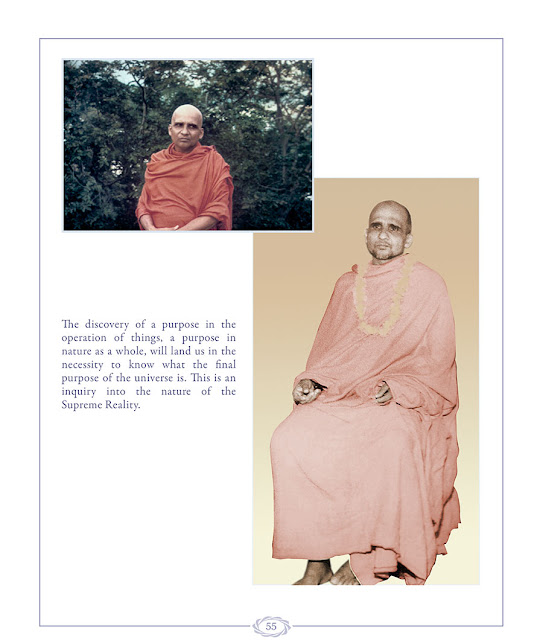KENOPANISHAD - 1.2.7. Swami Krishnananda.
=======================================================================
=======================================================================
Tuesday, September 20, 2022. 07:00.
SECTION TWO
MANTRAM 4.Post -7.
MANTRAM 4.
========================================================================
MANTRAM 4 :
Consciousness should be realised as the fundamental basis of all mental experiences. It should be realised in every state of our life in waking, dreaming and deep sleep. All thoughts are heterogeneous in their nature. They are not connected with one another. But they are experienced as belonging to one person because of the unity of the Self within. Our body, senses and mind are all made up of scattered parts that appear to be a unified whole because of the underlying indivisible essence. If only the Self were not there, our personality would be thrown away into the condition of atoms, disconnected and varied. There is no difference at all between the building bricks of one body and of another body. All are made up of the same earth, water, fire, air and space. But bodies appear to be different, they act in different ways, because the actor is not the body. Differences are in the desires within. This shows that man is not the body. When we speak to a person we do not speak to the body at all; we speak to the character hidden within. Even the ultimate constituents of this inner character do not differ from person to person. The same force acts as the substantial essence of all minds. But this substance of minds whirls in different directions at different centres of existence, thus creating differences. This whirling is called the mind, and this way of whirling is called a desire.
Therefore, desires differ from person to person, and consequently bodies also appear to be different, as the body is controlled by the mind. With all these distracting characteristics which a person is made up of, he appears to be a whole being, without differences at all. The external ugliness is hidden by the reflection of the inner beauty of the Self. This synthesising nature belongs to consciousness and not to thought. The states of waking, dreaming and deep sleep differ from one another, and yet, a person feels that he alone exists during these three states, without difference. He identifies himself as a single unity in all changes that take place, whether in mind or in body. Waking, dreaming and deep sleep are mental conditions, manifested, slightly manifested and unmanifested. But the Self is neither the manifest nor the unmanifest. It is immutable. It is the General Ground underlying all particulars. Particulars are deviations from the natural Truth. All particularities are self imposed, i.e., created by the individuals. But the generality of the essence is common to all. Even the particulars have no life and value without this general being, even as a pot has no value without clay.
Samyagdarshana is correct perception of things as they really are. It is a spiritual condition and not an act. It has no concern with the changes that take place in the body and even in the surface-consciousness of the mind. It is, in other words, simple knowing. All objective knowledge breeds birth and death, because knowledge of objects means an underlying desire for objects. We cannot think of anything without having a love for it, positive or negative, and every love is a deviation from the law of Self-Existence. When we love an object, we deny ourselves, or rather, we deceive ourselves, because we, thereby, sell ourselves to that object. Because the object changes itself, and because our love for that object also hunts, after it, and because our love is inseparable from ourselves, we appear to die when the object vanishes, and take rebirth in order to find that object of love. Perception of diversity means moving from death to death, because we are courting thereby self-transformation, due to our desire for identifying ourselves with the diverse forms of objects.
Self-knowledge, therefore, consists in self-identical, immediate, non-relational knowledge. Knowledge, however, cannot be an attribute of the Self. If so, what is the nature of the Self? We cannot say that the Self is other than consciousness, holding that consciousness is its attribute. Else, the Self would be unconsciousness, which, however, is not our experience. The Self is not a substance having attributes. If consciousness is an attribute of the Self, there would be rise and fall of the knowledge of the Self. It is not possible for us to say what would be the nature of the Self in essence, if it is not consciousness. Without consciousness, it would become a dull substance, ever changing, partitioned, impermanent and impure, which conclusion is, however, illogical.
The theory that the knowledge of the Self is the result of the contact of the Self with the mind is incorrect. This theory reduces the Self to unconsciousness. Several of the declarations of the srutis (Upanishads) would be contradicted by this theory. Because the Self is all-pervading, there would be an eternal contact of the Self with the mind, as wherever the mind is, the Self also is. What, then, is the meaning of remembrance and forgetfulness? There would be no forgetfulness at all because of the perpetual contact of the Self with the mind. Moreover, it is wrong to hold that the Self can be in contact with anything, because the Upanishads deny such a possibility. Only a substance with attributes can be in contact with another substance with attributes. The mind has attributes, but the Self has none. Infinity cannot be in contact with perishability. The knowledge of the Self is not the effect of its contact with the mind, as the acceptance of this theory would be to accept that consciousness itself is transient. The Self is eternal knowledge in its very essence. It does not require any contact therefor.
*****
Mantram 4 to be continued....
=========================================================================










Comments
Post a Comment